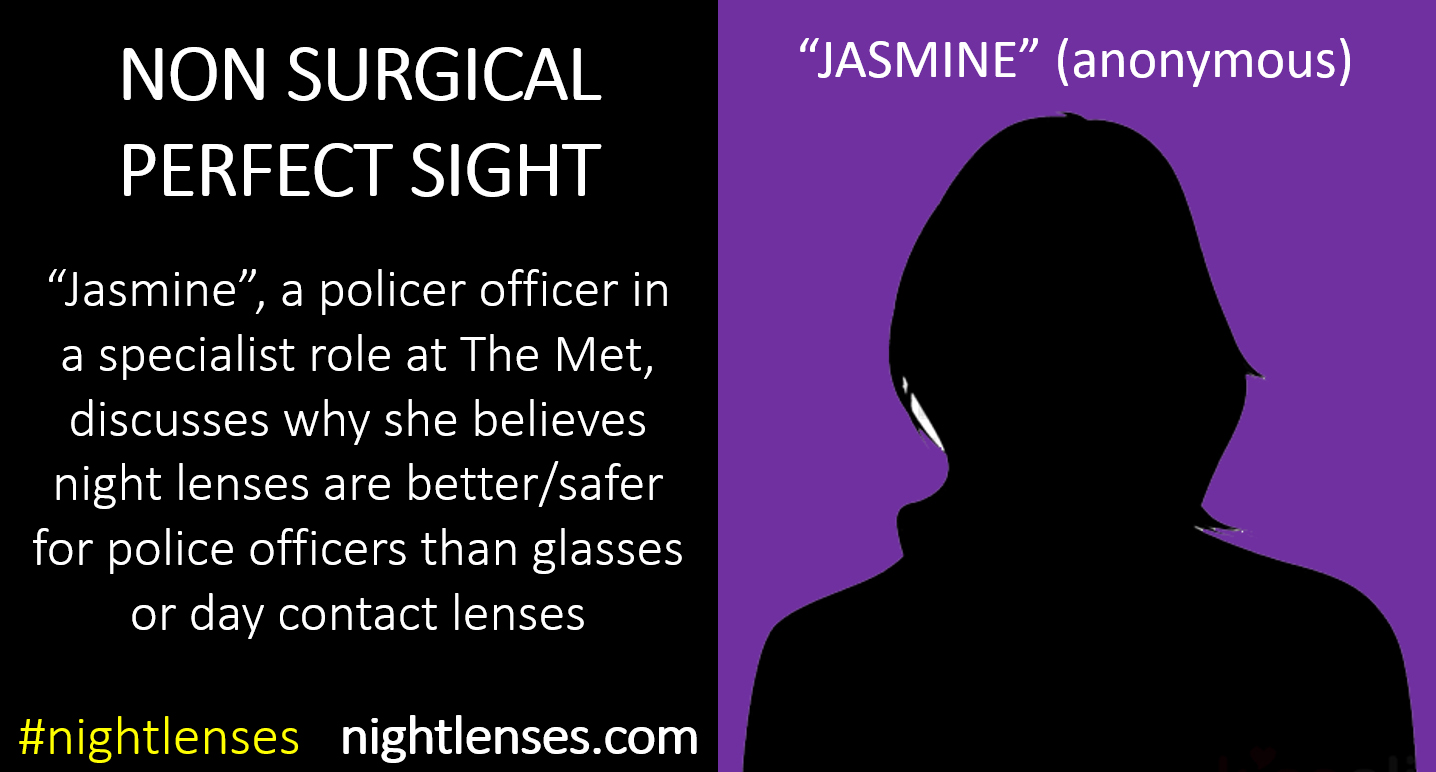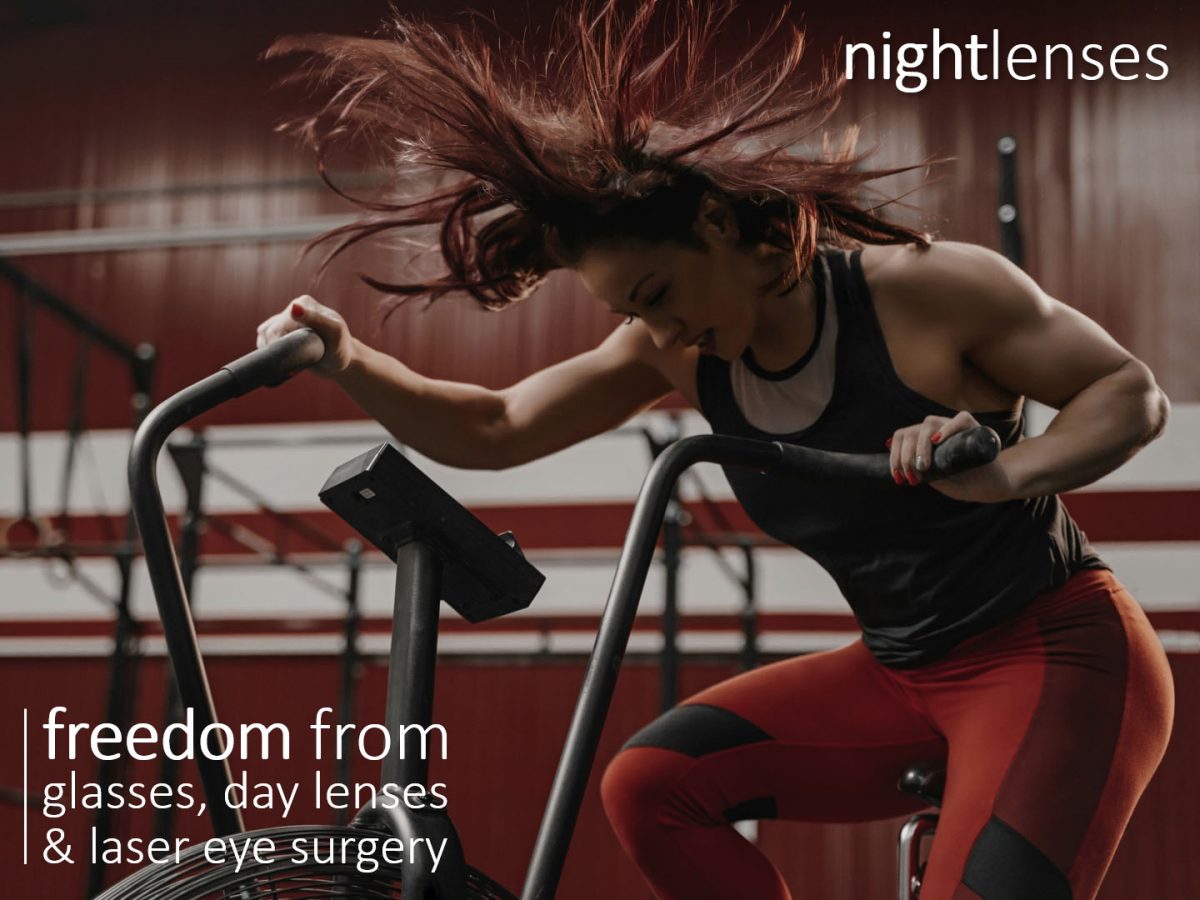Part 1: We had a chat with officer “John” (keeping it on the down-low), aged 47, who rocked the front line with TSG for 13 years in Northern Ireland. John just got set up with night lenses, and let me tell you, they flipped his world upside down. He wishes he’d hopped on the night lens train earlier, for both the job and home life. According to him, policing is smoother and safer with night lenses compared to the daytime ones. Dive into John’s interview HERE.
Part 2: Following up on John’s story, we had a chinwag with night lens wearer “Jasmine” (not her real name, gotta keep it hush-hush), a police officer rocking a specialist role in The Met. Check out the transcript of her interview below, or if you prefer visuals, catch the interview on YouTube HERE.

Absolutely. I was told I needed glasses when I was a teen, but I wasn’t a fan. So, at 16, I transitioned to contact lenses. When I joined The Met at 18, I decided to opt for laser eye surgery at 21. I enjoyed about 12 to 13 years of solid vision. As my sight started to fade, I found myself at a crossroads – should I go back to contacts or glasses? That’s when I stumbled upon night lenses. Honestly, I didn’t know what they were, and I was a bit wary. But the more I delved into it, the more I thought it could be a solid choice. The concept appealed to me – it was straightforward, idiot-proof, really. Pop in the lenses before bed, snooze, and wake up with corrected vision. It was hard to wrap my head around it – felt like it couldn’t be right, like a typo. Pleasantly surprised to find that by morning, my vision was spot-on. It felt like wearing glasses or contacts without having anything in my eyes. The relief of not dealing with either of those and still having perfect vision all day was fantastic.
Given your shift work, was there any concern about night lenses and your schedule?
Not at all. If I’m on night duty and sleeping during the day, I toss in my night lenses. When I wake up, out they come, and I’ve got clear vision through the night. Regardless of the shift, as long as I wear them during my sleep – and I only need a minimum of 4 hours to notice the difference – that’s enough for a full day of perfect vision. I’ll probably get a day and a half before realizing I need to pop them back in. The difference is that every day, I can head to work without the fear of my contact lenses dropping out. Especially during prolonged wear – as most police know, you think you’re done, and then you get that last-minute call, or you’re on an extended duty, and before you know it, you’ve done 20, 24 hours. You’re tired, eyes are dry, constantly blinking – it’s great not having to worry about that or reaching for eye drops. Coming across night lenses was a game-changer for me.
In our previous interview with another officer, “John” from TSG in Belfast, who started night lenses in his late 40s, mentioned similar benefits. He was in an active operational role and emphasized the relief of having perfect sight and nothing in his eyes in critical situations. Now, let’s talk about your operational role. You mentioned two parts – the earlier operational days and then moving into a specialist role. Looking back at the operational side where CS gas might come into play – if you had night lenses instead of day lenses at the time, do you think things would have been easier and better?
Absolutely, without a doubt. I would recommend night lenses to anyone considering day contact lenses. If we had to deploy CS spray or PAVA nowadays, there’s no worry about the after-effects. Some might be okay, but for me, it affected me just as much as the person I was dealing with. So, it’s reassuring knowing you don’t have anything in your eyes that could add to the irritation. Given the choice, I’d go for night lenses over day contact lenses, especially knowing that PAVA won’t mess with your night lenses afterward.

Absolutely! I’m into things like HIIT and circuit training, pretty high-impact stuff. The best part for me is knowing I can engage in all that without worrying about losing my contact lenses. If they fall out, they hit the floor, no biggie. It’s fantastic for high-impact activities. Another thing I love is swimming. I have a little girl, and when we hit the pool, I can dip my head underwater without stressing about not seeing what’s going on or losing a lens. No worries about checking the clock or anything. Everything is crystal clear, exactly as expected, but without the hassle of wearing contacts or glasses. I’ve been rocking night lenses for about seven years now – no going back to daytime lenses. If I’d known about these before my laser eye surgery, I might’ve gone for night lenses first. Many folks think laser lasts 20 to 30 years, so you don’t need to deal with it until your 40s or 50s. Realizing that I’m exploring alternatives less than 15 years later, knowing what I know now, I’d have started with night lenses.
It’s great to hear from someone who’s been through both laser and night lenses. People often think laser surgery is a one-and-done permanent solution, but it’s not! There are risks, and some end up with floaters and other issues. People are genuinely scared of the concept. It’s fascinating that you’ve experienced both. So, for those considering laser, you’re saying night lenses offer a good way to transition to a glasses and contacts-free life, test the waters – and laser can come later?
Exactly! Laser is an option later on. One thing I appreciate is that my prescription hasn’t changed over the years – consistent for seven years. Night lenses have kept my eyes steady. With Lasik, I was slowly deteriorating. So, if you’re not a fan of surgeries or find laser a big commitment, try night lenses as a solid alternative. I wish I’d known about them earlier.
Before this, we touched on the term ‘myopia.’ It’s interesting that I informed you that you have myopia! [Jasmine laughs] For those listening who might not know, ‘myopia’ is what you call ‘short-sightedness,’ a medical condition linked to eye diseases and detached retinas. Firstly, do you think colleagues with short-sightedness need to know that term and understand it? Secondly, as a parent with myopia, chances are your child might too. Is this something worth exploring and learning about for your child?
Absolutely! At the big-name places on the high street, it’s ‘short-sightedness’ and ‘long-sightedness.’ Nobody talks about myopia. I didn’t know about it, but I do now. Short-sightedness is often downplayed as not too serious, fixable with contacts or glasses. When you realize it worsens over time and can lead to eye diseases, it’s an eye-opener. I admit I was naive or didn’t think about it. Now that I’m more aware, I’m more cautious. It’s better to stay on top of this than be overly relaxed. There might be an underlying health issue that needs attention. With night lenses, it’s been good because I visit my independent optometrist yearly for extra check-ups, giving me insights into any changes or issues in the back of my eyes. You might not always get that with some big high street chains – I know I didn’t get those same check-ups there, but I do here. It’s nice to make comparisons and say, “This is consistent for me,” or “There’s something here that needs further medical attention.”
On that note, a shoutout to Jaimin Patel, your optometrist at Vision Eyecare. I know he’s an example of a fantastic independent optometrist who invests the time. Jasmine, we’re around the same age, needing basic info to understand our options and what happens to our eyes as we age. That’s why I encourage all short-sighted people to ask for a MyopiaChat next time they visit their optician.
Final question in two parts – first, would you recommend night lenses? [Pretty sure we know the answer!]. Secondly, like ‘John’ from TSG, I asked him a big question, so I’ll ask you the same – is it safer for police officers fitted with night lenses (less than -6D) to use them over day lenses, considering their roles?
I’d definitely say it’s safer for officers to have night lenses. Let me share some reasons and examples based on my 13 years in operational or frontline policing. In confrontational situations, when you’re in a scuffle, you’re not thinking, “If I get punched, is my contact lens going to fly out?” If you’re using PAVA or another option, knowing how badly it’ll affect you if you react to it is crucial. During extended duties, wearing daily lenses – they’ve come a long way, but after 18 – 20 hours, you start feeling the effects – dry eyes, thinking, “I need to put drops in.” But I don’t have to worry about that. It’s actually nice not stressing about my eyes drying, becoming itchy, or constantly blinking to keep them lubricated. For those reasons, I’d say definitely give night lenses a try. Jaimin, my optometrist, was excellent. It’s time-consuming for him to get it right because they’re individual to each person [Note: All night lenses are custom-made, not mass-produced]. But once he got them right for me, I’m glad I did it because I’ve had years of perfect vision. I can go about my business without worrying about glasses. I can do anything, go from here to the sauna or steam room, and not stress about taking my glasses off – because I can see – or an infected contact lens. It doesn’t impact my personal, social, or work life. It’s a good balance for me.
Indeed! I mentioned before the interview that the reason I’m here, doing this, is that my teenage son’s life was completely changed by night lenses. That’s why I spend my time doing these interviews and spreading the word. He’s 17 now, a surfer! If we hadn’t stabilized his myopia with night lenses, he might have gone up to -6 or -7 and progressed from there. With no glasses or contacts, he wouldn’t see the waves. But now he surfs, has confidence, so I agree that night lenses really are fantastic!
Thank you so much for your time and sharing your story. We really appreciate it.
Further info
